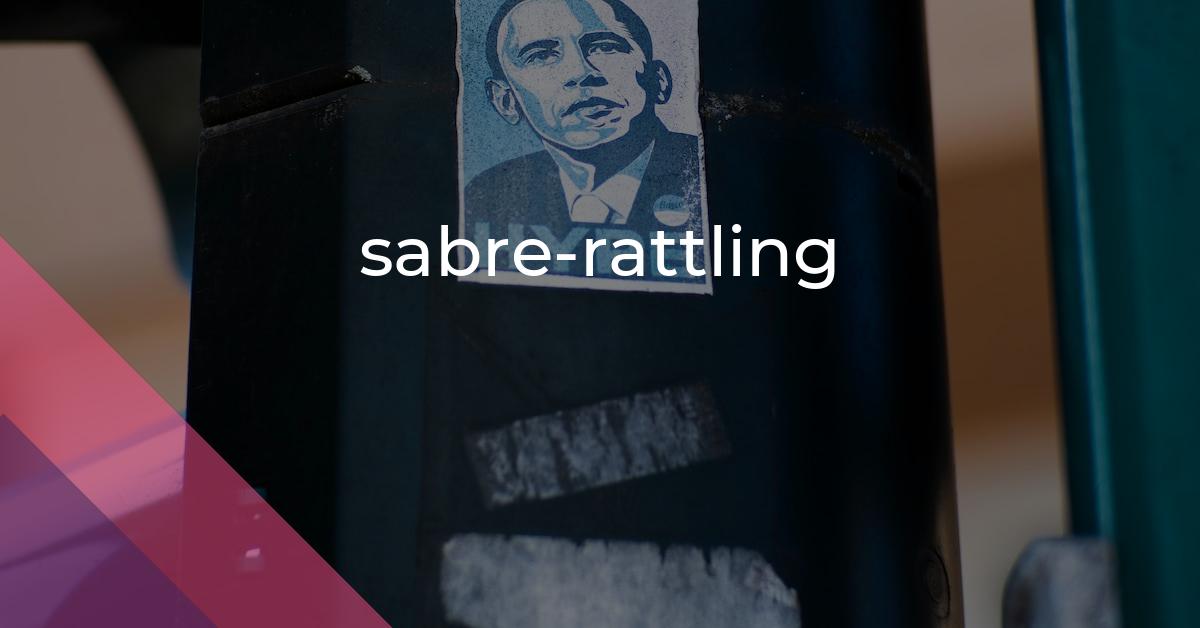sabre-rattling: Idiom Meaning and Origin
What does ‘sabre-rattling’ mean?
The idiom "sabre-rattling" refers to aggressive and threatening behavior or actions used to intimidate or provoke others, often through military displays or aggressive rhetoric.

Idiom Explorer
The idiom "scare story" refers to a sensational or exaggerated news article or report created with the purpose of causing fear or anxiety among the audience. It often relies on shocking or alarming information to attract attention, but may not always be based on factual evidence.
An idiom that refers to the spreading of false information or gossip about someone or something, often with the intention of damaging their reputation.
The idiom "rub someone the wrong way" means to irritate or annoy someone, often due to a mismatch in personalities or preferences.
The idiom "rub salt in the wound" means to worsen a difficult situation by adding insult or further distress to someone who is already suffering or upset.
The idiom "rub in" means to emphasize or remind someone of something, often in a way that causes annoyance or embarrassment.
The idiom "roar back" means to make a strong, energetic comeback after a period of setback or decline.
The idiom "rip-snorting mad" means to be extremely angry or furious.
The idiom "read someone the riot act" is used to describe when someone is given a stern warning or reprimanded for their behavior or actions.
The idiom "razz someone's berries" means to mock or tease someone in a playful or lighthearted manner.
Decoding the Menace
The idiom "sabre-rattling" refers to the act of making threatening gestures or statements, usually in the realm of international relations, as a means to intimidate or provoke others. It is believed to have originated from the practice of military commanders rattling their sabres, a type of sword, as a show of force and aggression. In its figurative sense, "sabre-rattling" implies the use of intimidation tactics or displays of military strength to assert dominance or gain an advantage in a diplomatic or geopolitical context. It often involves the issuing of warnings or threats, either verbally or through actions, in order to intimidate opponents or sway public opinion. The term is commonly associated with instances of aggressive foreign policy, such as during the Cold War between the United States and the Soviet Union, when both superpowers engaged in confrontations and displays of military might to assert their dominance. Historically, sabre-rattling has been employed by political leaders and governments alike to project power and influence, both domestically and internationally. It serves as a way to demonstrate resolve and determination, particularly in situations where compromise or negotiation seems unlikely or unfavorable. This idiom highlights the performative nature of diplomacy, where words and actions are carefully chosen and orchestrated to convey a specific message or image. The use of sabre-rattling can be seen as a form of psychological warfare, aiming to instill fear or apprehension in opponents and generate a perception of strength and resolve. This can be related to the idiom "all bark and no bite," which refers to someone who talks tough or makes threats but does not follow through with action. In the context of sabre-rattling, this idiom can be used to describe a situation where a country or leader makes big promises of aggression, yet fails to back them up with significant action. While sabre-rattling can be an effective tool in certain situations, it also carries risks and potential consequences. It may escalate tensions and lead to an arms race or even military conflict if not carefully managed. Additionally, the effectiveness of sabre-rattling depends on the credibility and perception of the party employing it. If the threats or displays of force are perceived as empty or insincere, they may fail to achieve the desired outcome. In relation to sabre-rattling, another idiom that comes to mind is "ruffle someone's feathers." This phrase refers to causing someone to become disturbed, agitated, or upset. In the context of international diplomacy, sabre-rattling can certainly ruffle feathers as it creates a sense of unease and uncertainty among other nations. The aggressive posturing and intimidating tactics associated with sabre-rattling can understandably ruffle the feathers of those who feel targeted or threatened. Overall, the idiom "sabre-rattling" captures the notion of using intimidating gestures or statements, often in the context of international relations, to project strength and dominance. It reflects the performative nature of diplomacy and the use of psychological tactics to influence opponents. While potentially effective, sabre-rattling also carries risks and should be approached with caution and careful consideration of its potential consequences.
Example usage
Examples of how the idiom *sabre-rattling* can be used in a sentence:
- The neighboring countries engaged in sabre-rattling over territorial disputes.
- The politician's speech was filled with sabre-rattling, threatening war if his demands were not met.
- The company's aggressive marketing campaign can be seen as a form of sabre-rattling to intimidate its competitors.
More "Military" idioms



